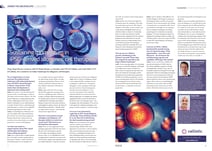
As published in Drug Target Review - March/April 2023 Issue
Drug Target Review connects with Stefan Braam, PhD, co-founder and CTO of Cellistic, and Andy Holt, CCO of Cellistic, to get a rundown on today’s landscape for allogeneic cell therapies.
We’re beginning to see more and more first-patient-dosed milestones with iPSC-based therapies in Phase I clinical trials. What makes those developments so important and exciting today?
Stefan: We’re just 17 years forward from the invention of the core technology, so it didn’t take a lot of time to achieve broad acceptance. But what’s been difficult is to really understand what it takes to differentiate an iPSC into a cell of interest. Fortunately, we’re at the point now where we know how to do that. We know how to control them and scale them and, as a result, we’re seeing iPSC therapies progressing into clinical trials.
Andy: It’s something to be celebrated, to be sure. The simple truth is, somebody’s gotta be first. You can’t have an approved therapy until you have a clinical trial, and now that we have clinical trials, we’re finally ideally positioned to see how it’ll all start playing out.
Are there any myths or misperceptions about iPSC-based cell therapies that the industry tends to keep bumping into?
Andy: Not so much myths or misperceptions, but we do tend to run into questions that we have a good “Version 1” answer for, but not yet the final answer for. How do we modulate immune response? What’s the right starting cell type? What’s the right reprogramming technology? There’s a lot of “pursuit of perfection” going on when we have adequate answers right now.
Stefan: I agree with Andy. We’re seeing that the first programs moving into the clinic right now have multiple gene edits. So with iPSC, there’s a real promise to make a cell that’s fully fit-for-purpose to, for example, attack a tumor. It’s a little bit of a combination of iPSC technology and synthetic biology to get to the most potent cell that will be very well-equipped to attack a tumor cell. There are still questions around that – basically, what set of gene edits is required – and it’ll take clinical trials to figure that out.
How have conversations around autologous and allogeneic cell therapies shifted or evolved over the last few years? What factors are driving those discussions?
Stefan: There are niche applications for autologous where it’ll be the best choice, like the CAR-T cell therapies on the market right now. But autologous remains process-centric, meaning it remains very hard to reach enough patients to make the economics work. At some point, it simply gets exhausted as you go to larger indications. To get the cost down and get the access up, you have to go to allogeneic.
Andy: There’s a history of allogeneic therapy in the market, but iPSCs coming to the forefront in allogeneic is really the new conversation taking place. And as autologous cell therapy gets more and more clinical and commercial validation, it’s nice to see that conversation mature to the point where it’s, “Hey, there’s a big tent here. There’s room for all of this.” No modality has entirely supplanted another. And for the first time in the last few years, we’re starting to hear, “I’m not going to stay with autologous. If I see it [my approach] working in autologous, I’m going to switch to allogeneic.” And that’s huge.
Let’s say I’m interested in exploring an iPSC-based allogeneic cell therapy. What attributes should be on my short list in identifying the ideal manufacturing partner?
Stefan: From my viewpoint, it’s expertise, expertise, expertise. If you think cell manufacturing is difficult, iPSC-based approaches are that much more so. You’re starting with a stem cell that can become any cell in the body, so controlling the biology is a lot more sophisticated than a process where you simply care about transfecting something in or expanding cells. Here, you’re instructing the cell to become the right cell type and that’s actually one of the core reasons for why it took a long time to get to clinical trials.
Andy: Exactly. You’d want a high level of expertise, given the complexity of the tasks. You’d want experience in iPSC-derived allogeneic cell therapies. And you’d want a team quite knowledgeable about scale-up with the facilities to tolerate it. On that final point, it’s really more about how well it [the manufacturing] is optimized for fit-for-purpose programs, how efficiently you run it, and whether you have an understanding of how to roll with the punches when things get interesting, which they inevitably will as you bring one of these therapeutics forward into GMP.
How do you see Cellistic’s growth contributing to the industry’s growth? Where does the company fit naturally in the larger industry landscape?
Andy: We’re a speciality player. If we’re going to succeed, we need iPSC allogeneic cell therapy to be viable and, of course, we believe it is. That’s what we have expertise in, and that’s what we’re here to do exclusively. In the larger CDMO and cell therapy landscape, we’re a narrow and deep player, which is a bit unusual. We’re hoping that we can fit into a rising tide around iPSC-derived cell therapies and accelerate them – that is, to help them reach more people faster.
Stefan: And our model is a little different. We enable allogeneic cell therapy by making our technologies broadly accessible to therapeutic developers. We’re not necessarily only working with people who are committed to iPSC, but we’re primarily focused right now on companies that are working on autologous but are already thinking about how they can make their next product allogeneic. So we want to disrupt the industry by making the technology broadly accessible, and with that model, we can secure a seat at the table to make iPSC-based allogeneic cell therapy a success and a reality.
Last year (in 2022), Cellistic purchased the manufacturing arm of Celyad Oncology. What opportunities – near-term and long-term – do you project that that manufacturing capacity and capability will open up to the market?
Stefan: For me, it’s all about credibility. We can only call ourselves a CDMO when we have all the capabilities required to develop and manufacture a product. In our case, we essentially looked across the globe for the right opportunity. With new technologies moving the way they are into manufacturing, I think you really need to have your research and development experts sitting very close to your manufacturing experts. That’s why we’re consolidating the whole team in one location, with our R&D team being 50 meters away from our GMP facility. I think that’s the best way to de-risk the manufacturing of the novel therapies we’re going after.
Andy: It opens up immediate opportunities to move into allogeneic in a way that didn’t exist before, and grants a bit of a different finish line. We can get you to the clinic now. We can get you all the way into GMP and into a clinical trial, whereas before, we were really focused on development. Now we can be a development company and a manufacturing company, which was always the vision, but now it’s real. Having a partner like us that’s entirely focused on this [iPSC-derived allogeneic cell therapy] should be enabling to you as someone who’s thinking, “I really want to be in the allogeneic space – I think iPSC is the way forward for me – but I just don’t see a place that can get it done and I’m not going to invest the capital in my own facility.” We have an answer for that now. We can take your therapeutic concept and take it all the way to the clinic in our hands.
Stefan Braam, PhD | Co-Founder and Chief Technical Officer
Stefan Braam, PhD, is the co-founder, patent-holder and visionary who blazes Cellistic’s scientific trails. He co-founded Pluriomics/Ncardia (a sister company of Cellistic) in 2011, and, as the inventor of its core technologies, has been instrumental in the growth of both organizations. Stefan has been published in leading scientific journals, is an inventor on multiple patent families, secured multiple grants and commercial research collaborations, and was instrumental in Ncardia pre-seed, seed, Series A and B financing rounds.
Andy Holt | Chief Commercial Officer
At Cellistic, Andy Holt leverages his experience in scaling up cell and gene therapy platforms to help Cellistic clients reach their goals in allogeneic cell therapy. When he joined Cellistic in 2022, Andy brought with him more than 15 years of experience in cell and gene therapy to the company. In his prior roles, he held business development, corporate development and management positions for CDMOs, driving commercial strategy and growth in adeno-associated virus (AAV) gene therapy manufacturing.

